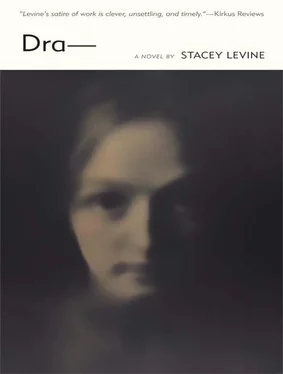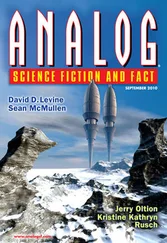“But you called him.”
“I didn’t!” she protested.
“You wanted the Nurse, you wanted the doctor. But, son of a gun, what you really needed was me!”
Staring at the floor, mind aswirl, she imagined herself breaking from this room as if from the top of a box and leaping onto the first fast-plowing train that passed, a train which would impel her in wild circles and at great speed to the Nurse and only the Nurse, or perhaps, in a chance beyond chance, into the lap of the very woman who sat before her; and imagining this, she cried out until her mouth burned with the simple, punishing taste of wishes.
Then, in the mirage-like silence that hung in the room, the Administrator, flushed, said quietly, “Isn’t it strange that people possess strength, even when there is really no good reason that they should possess it?”
Dra— then broke into fresh, pestilential sobs, holding her elbows as if to comfort each, while the Administrator’s voice rang out intensely, “You see? Female sadness is everywhere! Women are sadder, everyone knows that. We put women in groups and ask them to look at pictures of sad faces or of a war, for example, and they cry and cry, maybe from shame! Why shame? We don’t know, or rather, we do, but we can’t say it and expect anyone to listen! When people and animals are sad, they can’t calculate well and their desires disappear and that’s because sadness takes over the brain like you wouldn’t believe.” She gave forth a tempestuous sigh.
Dra— stared dumbly with a rattled, amazed expression at the woman, who grew quiet, her troubled, complicated gaze fanning across the room and settling onto a small apple that lay on the floor.
“Why not come along to luncheon with me in the Administrators’ cafeteria?” she asked. “Solitary tables only, you know, but they move on an up-and-down course, spinning like wild things — it’s exciting! Marvelous eggs. We’ll talk and talk, for years if you like, about our relationship, and other people, and about the way bodies work; we’ll talk and talk until there’s nothing left but ashes all around us. Isn’t that what a relationship is?”
“Ah—?” was her disbelieving reply, and as her eyes flickered toward the Administrator’s with suspicion and appreciation, she became aware of a sensation inside her much like warmth. Motionless, she stared at the back wall of the room, which was covered by bundles of wiring.
Her agitation had evolved into a slow, rich, ravishing happiness which, though first seeming to emanate from the Administrator, was actually formed, she saw, of her own sprawling muscles and veins; as she lowered her head, the happiness revolved like an object, possessing organization and breath of its own, and she rolled her eyes to gaze at it, for it was like a long, complicated story, and she began to read it.
The Administrator, now winding a skein of gray yarn around her hands, was saying with quiet anxiety, “Isn’t it strange, how people need one another? Some days, I tell you, I still can’t believe it’s true.”
The woman rose and reached her arm into a drawer inside the wall, retrieving a small telephone, the sight of which made Dra— close her eyes and inhale with rolling pleasure, for the instrument was made of smooth glass that curved into dips and hollows just as alluring, certainly, as was the heady promise of using it endlessly and exclusively to call another party, someone who like a miracle devoured and filled up everything in life in the same effortless way that other people merely sat and breathed.
Standing against the wall, the Administrator shook and warmed the phone in her hands, trying to activate it; then, succeeding, she placed it to her ear, as Dra— stared dazedly at the woman’s beige stockings.
* * *
And later, as the two of them walked past the mouth of the dank Employee Tunnel, Dra— far behind the Administrator, she stared at the stockings still. As they rounded the tunnel’s final bulbous turn, entering the huge, damp, greenish station with its walls coated by a whitish substance, it dawned on her that they had come here because the Administrator was going to leave on a train, and Dra— stumbled forward, aware of numerous uncomfortable physical symptoms she dared not communicate.
It was true: for the Administrator was now calling wildly through the station for a train, and in between these shouts, she described Frida, her young assistant, who would be arriving soon.
“Frida is in nursing school,” the Administrator explained, “so she has low self-esteem. Be tolerant of Frida, won’t you? Watch out for one another while I’m gone. As for me, I have so many places to go, I’m dizzy! I do love rushing around, busy as I please; but don’t worry, if there’s a tornado warning I’ll race back here to you, umbrella in tow!” She picked at a near-transparent eye tooth. “Do try to understand that it doesn’t really matter if we can trust another human being or not — what matters is that we never feel we can.
“Oh, someday, you’re going to spring to life, I can just feel it! Then you’ll feel much less comfortable in the presence of pain,” she added.
Without another word the Administrator stepped onto the low train that departed as instantly as it had arrived, curving silently along the thick walls of the station, which were meant to deaden sound.
And observing this Frida — who now bounded across the platform toward her in overwide, enthusiastic strides, clutching her notebook to her schooldress, dark frizzed hair tied back in a short ponytail, and whose tongue extended sinuously from her mouth nearly to touch her nose, and who, with overbearing, cheesy breath, Dra— uncomfortably imagined, would be garrulous and difficult to withstand — she realized unpleasantly that the Administrator had vanished, and that she, Dra—, was now utterly alone with a stranger.
Out of breath, perspiring, busty in her dirty uniform, Frida ran up, scratching at her ears and neck. “I’m glad you stayed, I wanted you to, but now that I see you, you seem almost unreal!” She panted with a frantic smile, rolling her eyes, taking hold of Dra—’s neck with a hand and squeezing for a moment as if to verify her presence. “Do you know that feeling of unreality?” Frida said. “I do. I was afraid you wouldn’t stay with me and that would have made me die, because that’s what uncertainty does, it kills, sooner or later, that is. The Administrator said you might not want me along! But here you are. Doesn’t everyone want a little company? Sure they do, even if they’ve studied theory in school for so long that they can’t admit it.”
Frida turned away, running, leading Dra— through the swinging, tar-soaked door of the station and into a hallway filled with hingeless, broken cabinets and the dismembered legs of office desks. “For heaps of reasons, I wanted you to be here,” she went on. “I’ve always wanted a real friend and never had any, except for Pat Cook, but that was finished in one second. Please, won’t you come to the bathroom with me?” Frida, very nearly begging, was still breathless; and at the touch of the girl’s hand on her arm, Dra— agreed to go.
They moved through a steep downhill hallway and found at its end a deserted guard’s station with doors on either side, each leading into the same enormous bathroom.
“All my life I’ve had to go to the bathroom alone and I hate it,” Frida said bitterly, palm on the door. Her eyes filled with tears. “Why stay alone when it’s so difficult? But ‘no,’ they say, and firm themselves against you.” She cried for a moment, stopped, and then with great interest began to examine the surface of the nearby wall, fingering its texture, made up of small brown rises that appeared like human faces.
Читать дальше












